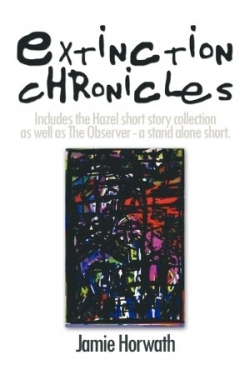Extinction Chronicles
It is always exciting to discover a new voice in the science fiction and fantasy genres. Rare is the writer who can splice the Lovecraft Cthulhu mythos with 1950’s Cold War fear and our twenty-first century worries of terrorism, xenophobia, and climate change the way Jamie Horwath has in the short story “Hazel,” which is part of his collection of short stories, Extinction Chronicles. “Hazel,” as well as the dystopian short story, “The Observer,” and the clever reboot of the werewolf mythos, “The Blood Harvest: Any Town USA” each examine a variety of horrific ways in which mankind is in the crosshairs of annihilation.
Extinction Chronicles shows great potential that is only limited by lack of editing. The overall punch of the stories is lessened by spelling and grammatical errors, and over-the-top purple prose that screams author intrusion. Even with such flaws, readers will still get sucked into the heart and marrow of each story. “Hazel,” the longest story in the collection, is a Lovecraftian nightmare wedded to the environmental disaster theme. Divided into four sections, Migraine, Bar Flies (this title contains a witty double meaning), Sub Blackness (cripple words), and Dwellers From Within, each story or vignette appears to be unrelated. The author weaves them together around his protagonist Kaley Walls.
The story begins when Kaley wakes from a nightmare with a seemingly innocuous migraine headache. She sets into motion a chain of events that changes her life and impacts all of humanity. The opening paragraph contains a sentence that demonstrates some of Horwath’s powerful descriptiveness and lyricism. He writes, “Her shadow flickered in the anemic moonlight.” The crafting of such an effective and haunting sentence allows readers to share Kaley’s nightmare. But the same story also has a sentence that reads, “Laugh, why would I laugh I’m hear to help you.” The misspelling of the word “hear” is a mistake that would have been found and noted in the proofs by an editor. Again, the sentence above about the anemic moonlight is gorgeous and descriptive in its simplicity and musicality. However, Extinction Chronicles also contains sentences that are clunky, full of author intrusion, bizarre similes, and metaphors that are more distracting than functional. Horwath writes, “The sound began to trip the light fantastic toe with Klein’s fading tone. Only to cast off the fading feeble attempt with an intimidating try at a diabolical click of social prepossession.” The meaning of the entire quote is unclear. Proper editing would have pointed these mistakes out as well.
Regardless, of the misspellings, typos, ambiguous sentences, and other short-comings, Horwath’s writing has some of the poetic prose of Ray Bradbury, the characterization skills of Stephen King, and the succinct narrative abilities and eclectic humor of Joe R. Lansdale and Clive Barker.
Reviewed by
Lee Gooden
Disclosure: This article is not an endorsement, but a review. The publisher of this book provided free copies of the book and paid a small fee to have their book reviewed by a professional reviewer. Foreword Reviews and Clarion Reviews make no guarantee that the publisher will receive a positive review. Foreword Magazine, Inc. is disclosing this in accordance with the Federal Trade Commission’s 16 CFR, Part 255.

